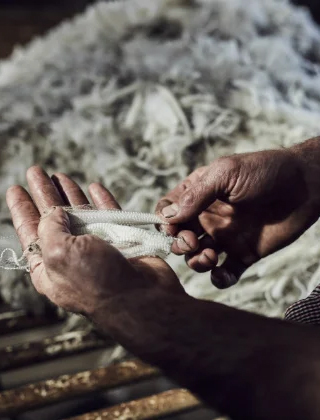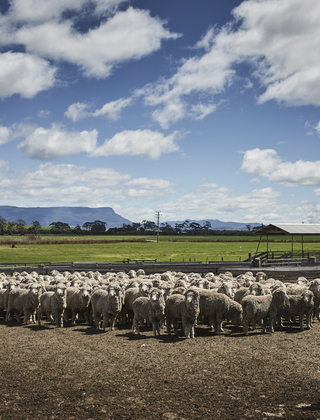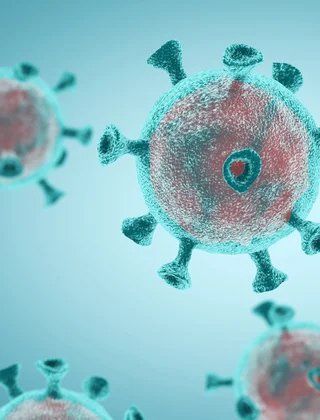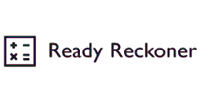Hand-on and practical stockmanship training
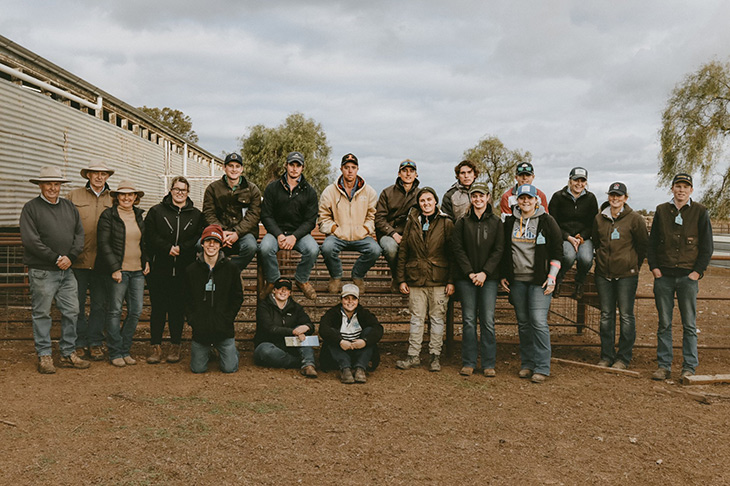
With the support of AWI, the Hay Inc Rural Education Program in the Hay district of NSW continues to help young people gain hands-on agricultural skills, training and experience.
The 16 young participants in the 2021 program at ‘Burrabogie’, pictured with (from the left) Hay Inc past chairman, Chris Bowman, who is a Merino sheep classer and Hay Inc volunteer trainer; AWI sheep industry specialist, Stuart Hodgson; and Hay Inc program manager, Sandra Ireson. PHOTO: Mads Porter Photography
With the support of AWI, the Hay Inc Rural Education Program in the Hay district of NSW continues to help young people gain hands-on agricultural skills, training and experience.
The 16 young participants in the 2021 Hay Inc Rural Education Program came to together in June for their third and final training week, which was followed by their graduation at the Hay Merino Sheep Show.
The Hay Inc Rural Education Program was launched in 2014 with support from AWI in response to concerns about the decline in the traditional jackaroo/jillaroo system in the western Riverina district of NSW and the associated lack of stockmanship and other essential rural skills being handed down to the younger generation.
“Through the Hay Inc program, young people are now being given the opportunity to learn the practical agricultural skills needed for them to get jobs on rural properties. It focuses on wool and livestock production and takes place in a practical setting in partnership with local woolgrowers,” said program manager Sandra Ireson.
“The program is delivered by trainers who have many years of experience on extensive rural properties, covering topics based around the production calendar for sheep, wool production and cattle.”
Applications for the 2022 training program are now open. Employers can send their employees on the program or other interested young people can apply directly. Applicants can be from anywhere and do not have to be from the Hay district.
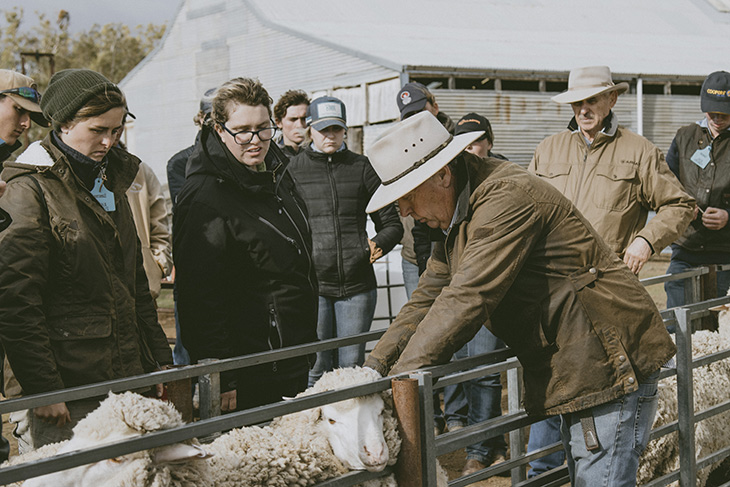
Chris Bowman and Stuart Hodgson teaching Merino sheep classing.
Practical and hands-on training
The Hay Inc program is a three-week course, in three blocks of five days’ training, usually spread over a nine-month period. Topics covered include sheep handling and yard work, shearing and wool shed management, sheep health and nutrition, Merino sheep classing, working dog training, livestock water maintenance, fence construction and maintenance, and small engine and motorbike maintenance.
AWI has supported the Hay Inc program each year since its inception and will be supporting the 2022 program. The application form for those aged 18 to 25 years is available on the Hay Inc website.
“Our funding in programs like this aims to help improve the engagement of young people interested in the wool industry, thereby developing and retaining the skills the wool industry needs to be innovative in response to new challenges,” said AWI CEO Stuart McCullough.
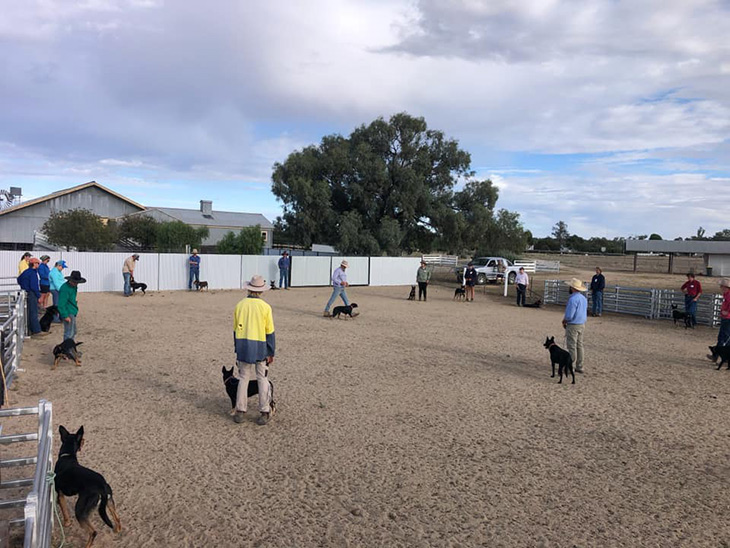
The 16 young participants learning how to manage working dogs during training at Shear Outback in Hay, with trainers Edward McFarland and Geoff McDougall.
How to replicate the training program in your community
A 20-page manual that shows how the Hay community came together to establish the Hay Inc Rural Education Program was developed and issued in 2019 by Sandra Ireson. It provides a model that can be adapted and implemented in other rural communities across Australia.
The manual is available on the Hay Inc website www.hayinc.com.au (click the Engage Ag logo in the top-right of the home-page screen) or contact Sandra Ireson directly at engageag1@gmail.com or on 0439 938 119.
More information: www.hayinc.com.au
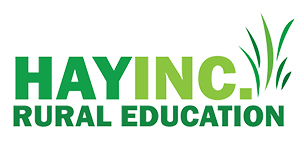
Hay Inc graduate is proof of the program’s worth
Rose Nevinson, who completed the Hay Inc program in 2017, presenting wool handling to the 2021 program participants, at Paraway Pastoral’s ‘Steam Plains’ property. PHOTO: Melanie Williams, Tocal College
Rose Nevinson completed the Hay Inc training program in 2017 and was so impressed with it that she has since gone on and joined its committee.
Rose Nevinson grew up on a Merino sheep station in between Hay and Deniliquin where her family has been for 125 years. She graduated from the Hay Inc Rural Education Program in 2017 while she was working at ‘Warwillah Station’ where she also completed her Certificate IV in Agriculture.
Since 2019 she has been working as a wool buyer for Seig Sheep & Wool which is a locally owned and operated woolstore in Deniliquin. However, she now also has a flock of Merino sheep of her own and breeds her own rams.
“I started in 2014 with 31 Merino ewes, and now I have 100 Merino sheep,” the 23-year-old said.
“I am hoping this year to finally become a stud. I’ve been breeding my own rams which I will be looking to sell in the future. It’s something I have been working up to for a number of years; it’s a passion project really.”
Rose says the practical approach to learning from experienced local trainers is a strength of the Hay Inc training program.
“In my first year out of school I was working on a couple of different stations around home (at Booroorban); I had also done a few courses at ag college. But the Hay Inc instructors are so knowledgeable – having been on the farm and in the industry so long themselves – and I knew I could learn even more from them. Hay Inc is great in that it’s not like going to school; it’s hands-on learning,” she said.
Rose joined the Hay Inc committee two years ago, and as Hay Inc is always looking at ways to improve the program, she suggested that wool handling should be in the program.
“When I went through Hay Inc we did the shearing and crutching school, and it’s still part of the program today, but it was not until I started working a Seig Sheep & Wool in Deniliquin that I realised just how important it is to know about wool handling too,” she said.
“It is important to know about clip preparation, because by doing so you are able to achieve higher premiums for the woolgrowers’ product. It’s about knowing how to skirt your fleece, and keep everything from bellies, pieces, crutchings etc separate, and realising that vegetable matter and yield play a big part in affecting value.
“Most jack and jillaroos would be mustering or doing yard work, but learning how to prepare a clip will prepare the participants for anything and will enable them to help whoever they are working for to improve value.”
This article appeared in the September 2021 edition of AWI’s Beyond the Bale magazine. Reproduction of the article is encouraged, however prior permission must be obtained from the Editor.






